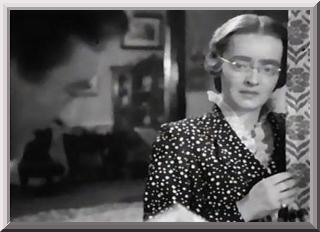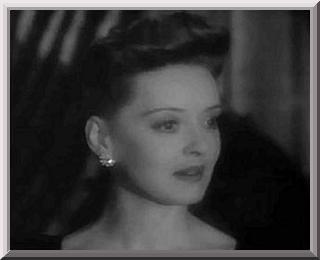


In Boston, a lonely, repressed, and unhappy "ugly duckling" Charlotte Vale (Bette Davis) is the middle-aged, spinster daughter of her cruel and domineering mother, Mrs. Henry Windle Vale (Dame Gladys Cooper). Charlotte is on the verge of a nervous breakdown. Her sister in law, Lisa Vale (Ilka Chase) is concerned about her condition and behavior and puts her in the care of a kindly and wise psychiatrist Dr. Jaquith (Claude Raines). On a stopover in Rio, Davis and Henreid enjoy a wonderful day and night together, then wake up to discover that their ship has already left the port. They stay in Rio for a few days and Davis experiences passionate love for the first time in her life, although she understands from the start that Henreid will never leave his wife. She falls in love with the handsome and suave European. In their famous scenes together, cigarette smoking becomes a sensual act. He asks Charlotte: Shall we just have a cigarette on it? Then, he puts two cigarettes in his mouth, lighting them and then handing one to Charlotte. After her adventure, an attractive and self-confident Charlotte returns to Boston, and in a dramatic scene, confronts her tyrannical mother and liberates herself from her maternal bonds. She becomes engaged to an eminent Bostonian Elliot Livingston (John Loder). But this is short-lived when she meets Jerry again and breaks off her engagement. Her actions contribute to her mother experiencing a stroke. Charlotte suffers from deep feelings of guilt and insecurity and returns to Dr. Jaquith at the sanitarium to resolve her inner conflicts. "Oh, Jerry, don't let's ask for the
moon. We have the stars."
Thought to be the quintessential "woman's picture", Now, Voyager is one of Bette Davis' best-acted and remembered films. It transcends the soap opera genre due to it's style and substance. Voyager holds a special place for those of either sex who have found the courage to escape the dark cloud of tyranny and oppression.

She is guided at a sanitarium by the helpful doctor, and Charlotte begins to restore her mental and physical health. She drops pounds and gains confidence daily, transforming into a self-assured swan within three months. At her doctor's suggestion, Charlotte boards a liner for South America. On the cruise, she meets Jerry Durrance (Paul Henreid), a man whose wife pretends to be in bad health to keep her unhappy husband from ending their marriage.



There, she meets Jerry's daughter Tina (Janis Wilson), a shy and withdrawn girl. Charlotte very much identifies with Tina who is similar to her own personality in earlier times. Charlotte, wishing to give Tina the chance that was offered her, helps bring the insecure girl out of her shell. In growing close to Tina, Jerry comes back into her life. The film ends with Charlotte and Jerry accepting that they cannot be together, but understanding that they have something far more enduring with Tina as the common bond between them.
The story was written by Olive Higgins Prouty, who also penned Stella Dallas, the durable soap opera from which three films were made. The title refers to Walt Whitman's Leaves of Grass. Irving Rapper directs well with this script which takes us through many different settings. He and cinematographer Sol Polito provide a wonderful
flashback scene where Davis relates the story of an early defiance of her mother, when she has a romantic encounter with a crewmember onboard the cruise ship on which they are traveling.
Her youthful appearance is so convincing, you wonder if perhaps you are watching some stock footage of an older film. Davis is supported by a strong cast in this film, actors whom she respected and got along with, by most accounts. Cooper was an excellent choice for the matriarchal dowager. Henreid and Rains, both great friends of Davis's, contribute top-notch work. Steiner's Oscar-winning score fits like a glove. Now, Voyager is Grade-A soap opera with uncharacteristic depth.


- Bette Davis - Charlotte Vale
- Paul Henreid - Jerry D. Durrance
- Claude Rains - Dr. Jaquith
- Bonita Granville - June Vale
- Dame Gladys Cooper - Mrs. Henry Vale



- Irving Rapper - Director
- Hal B. Wallis - Producer
- Casey Robinson - Screenwriter
- Sol Polito - Cinematographer
- Max Steiner - Composer (Music Score)
- Warren Low - Editor
- Robert M. Haas - Art Director
- Leo F. Forbstein - Musical Direction
- Kim Gannon - Songwriter
- Fred MacLean - Set Decoration/Design
- Orry-Kelly - Costumes/Costume Designer
- Perc Westmore - Makeup
- Richard Van Enger - Special Effects
- Willard VanEnger - Special Effects
- Robert B. Lee- Sound/Sound Designer


- Best Actress (nom) - Bette Davis - Academy
- Best Score (win) - Max Steiner - Academy
- Best Supporting Actress (nom) - Dame Gladys Cooper - Academy







